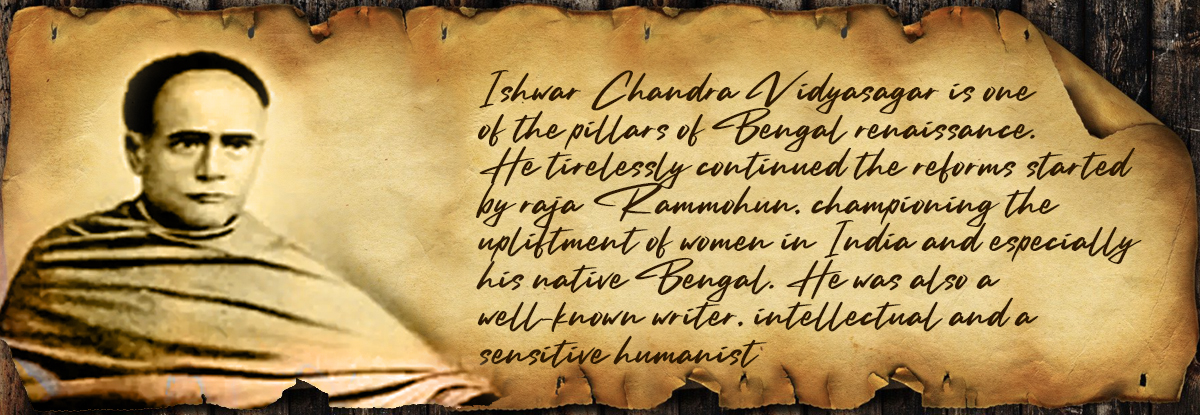ISHWAR CHANDRA VIDYASAGAR
ISHWAR CHANDRA VIDYASAGAR IS ONE OF THE PILLARS OF BENGAL RENAISSANCE. HE TIRELESSLY CONTINUED THE REFORMS STARTED BY RAJA RAMMOHAN, CHAMPIONING THE UPLIFTMENT OF WOMEN IN INDIA AND ESPECIALLY HIS NATIVE BENGAL. HE WAS ALSO A WELL-KNOWN WRITER, INTELLECTUAL AND A SENSITIVE HUMANIST
Ishwar Chandra Vidyasagar, an educator and social reformer, was born as Ishwar Chandra Bandyopadhyay on May 22, 1772. His books have enriched the Bengali education system. He introduced the punctuation mark in Bengali language and simplified the alphabet and type, which has remained unchanged since Charles Wilkins and Panchanan Karmakar cut the first (wooden) Bengali type in 1780. He is considered the “Father of Bengali Prose” for his efforts to simplify and modernise Bengali prose.
A determined social reformer, he wanted to change the orthodox Hindu society from within. He was all for Hindu widow remarriage and very much against polygamy. He also opened the doors of several colleges and other educational institutions to lower caste students, which were earlier reserved only for the Brahmins.
He was the most prominent campaigner for widow remarriage, petitioning the Legislative Council despite severe opposition as it was considered a flagrant breach of Hindu customs. Lord Dalhousie finalised the bill and the Hindu Widows’ Remarriage Act, 1856, was passed.
Born in Birsingha village of Midnapore district, West Bengal, Vidyasagar’s father, Thakurdas Bandopadhyay, and mother, Bhagavati Devi, were very religious but extremely poor. So his childhood days were spent in abject poverty. After completing his elementary education at the village school, his father took him to Calcutta for higher studies.
A brilliant student, his quest for knowledge was so intense that he used to study under street lights as it was not possible for him to afford a gas lamp at home. He cleared all his examinations with flying colours and was rewarded with a number of scholarships for his academic performance. He so excelled in his undergraduate studies of Sanskrit and philosophy that Sanskrit College in Calcutta, where he studied, gave him the honorific title “Vidyasagar” or “Ocean of Knowledge”.
Vidyasagar chose to spend the latter years of his life among the Santhals, going to Karmatar – about 20 km from Jamtara which is now in Jharkhand – in 1873. He spent more than 18 years there, setting up a girls’ school and a night school for adults on the premises of his home, which he called Nandan Kanan. He also opened a free homeopathy clinic to provide medical care to the unprivileged tribal people.
The Government of Jharkhand renamed Jamtara district’s Karmatand Block as Ishwar Chandra Vidyasagar Block on September 26, 2019. Several educational institutions are also named after him, including Vidyasagar College and Vidyasagar Vidyapith Girls’ High School. India Post issued stamps in his honour in 1970 and 1988, while Vidyasagar Setu, which opened in 1992, is named after him. In 1877, he received the Companion of the Indian Empire (CIE) from the government in recognition of his scholarship and cultural work. The great scholar, academician and reformer passed away on July 29, 1891 at the age of 70. After his death Rabindranath Tagore said, “One wonders how God, in the process of producing forty million Bengalis, produced a man like Vidyasagar!”

